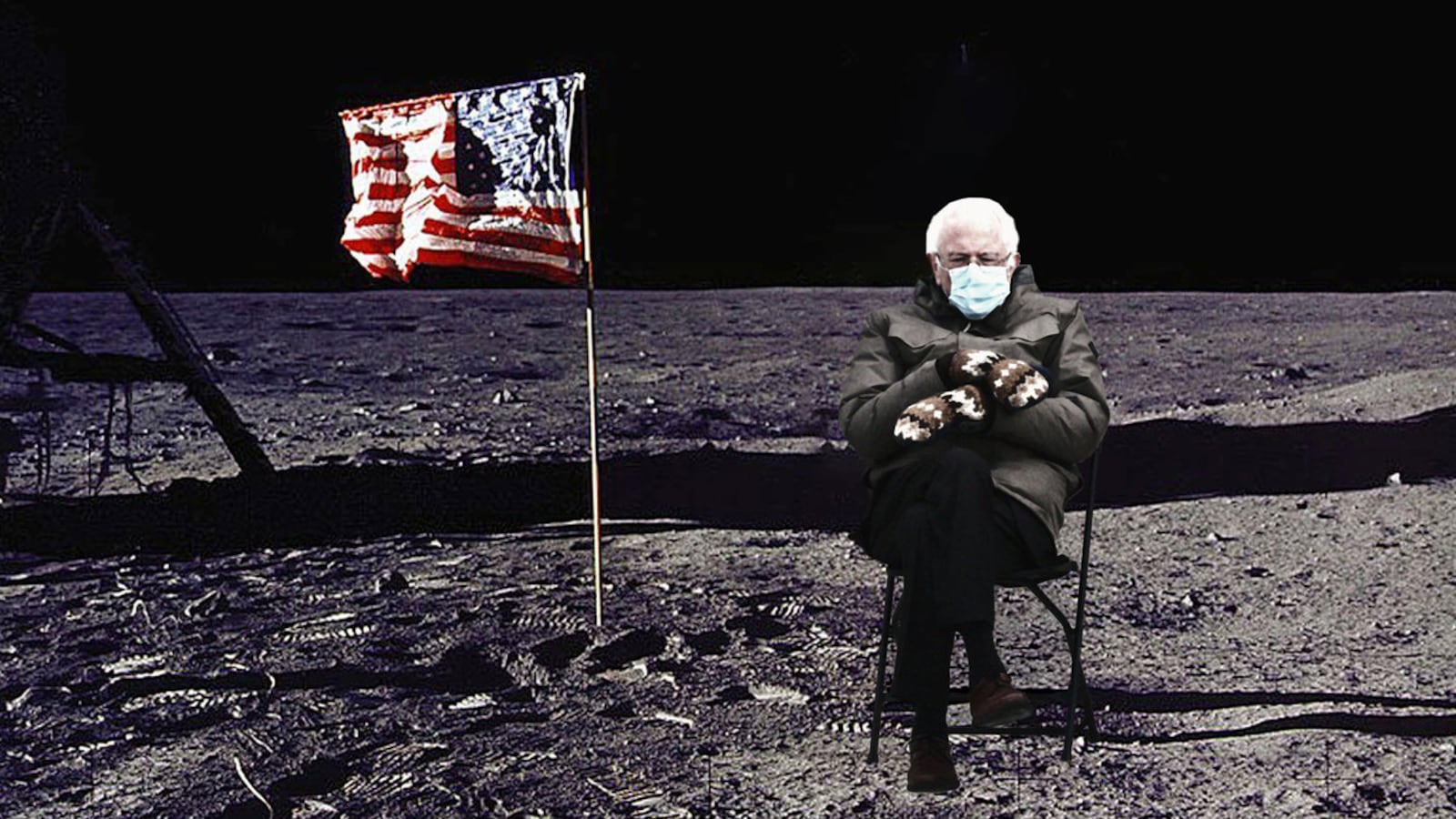Bernie is whining about the Space Race again.
In a column for The Guardian, Democratic Sen. Bernie Sanders lauded the 1969 moon landing as a triumph of the state, a shining example of political will and democratic socialist ideals. Now, he says, the capitalists have moved in after a “huge effort” to privatize space exploration, with the risks being “socialized” and shouldered by taxpayers.
It is an irresistible narrative: tax-dodging billionaires using tax money to colonize the universe! How could Sanders resist it? How could The Guardian? How could Twitter?
Scratch the surface, though, and you find shallow populist posturing. Sanders is rewriting history and cynically framing a net positive win-win as exploitation.
To start, the moon landing involved numerous private space contractors, as Tim Fernholz of Quartz pointed out last year, when Sanders’ ally Rep. Jamaal Bowman said, “We got to the moon without private contractors.” NASA administrator Bill Nelson retorted, “We got to the moon with American corporations.”
The fact is, there was only one fully public space program that tried to land on the moon—and it was run by the Soviet Union. Sanders and Bowman were echoing the same kind of politically convenient revisionist history.
But there’s another hole in Sanders’ narrative.
The “huge effort” to privatize space exploration was, in part, the result of efforts to defund NASA, which Sanders voted to do in 1996, 2000, and 2012. Ironically, it was this chronic underfunding that prompted Elon Musk to create SpaceX—after he discovered that NASA didn’t have a deadline to land on Mars.
When confronted about his voting record, Sanders said it was due to a “difficult choice about whether you vote to provide food for hungry kids or health care for people who have none and other programs.” He qualified the statement by saying that in general he supported increased funding for NASA.
The implication: we have bigger fish to fry before spending tax money on space.
Sanders was more explicit last year, when he tweeted: “Space travel is an exciting idea, but right now we need to focus on Earth and create a progressive tax system.”
It is unsurprising that Sanders would prioritize inequality over space exploration, but it begs the question of whether he would have supported the moon mission—or even the creation of NASA—had he been an elected official at the time.
The financing and political will Sanders lauded in his article—the democratic collectivist spirit of yore—is another “feel good” myth not backed by facts.
A 1965 Harris poll showed 57 percent of Americans believed money would be better spent on a less literal moonshot: new water desalination systems. A few years later, in 1967, only 43 percent of the public supported landing a man on the moon, according to another Harris poll. It was popularly referred to as a “moondoggle.” Fiscal conservatives argued it was a waste. As for the left, many couldn’t square the budget with existing priorities—like inequality. This attitude was encapsulated in the 1970 spoken word poem by Gil Scott Heron, “Whitey on the Moon,” a song that has gained renewed popularity in context of the new space race.
Ironically, The Guardian in July 1969 called a teachers’ union official a “cynic” for saying the moon landing was, “A trivial prestige exercise which ignored the social conditions existing in the world.”
It doesn’t take a leap of imagination to believe Sanders would have taken this very same stand back in the 1960s—especially because the moon mission did actually involve corporate contractors.
The Vermont senator repeatedly voted to defund NASA, opposed public private space exploration, and said Bezos and Musk shouldn’t be rich enough to fund space exploration. But even with a huge tax on unrealized gains, would Sanders be in favor of using any of the new tax revenue for space exploration?
Sanders helped create the vacuum that Musk and Bezos are filling—and both of the latter took on great financial risk to do so.
The notion that NASA is “socializing risk” ignores the fact Musk endured three failed rocket launches and was only saved from bankruptcy thanks to a NASA contract, awarded after a fourth launch (this one, successful). This privatized risk, paved the way to reusable rockets, and reduced launch costs by orders of magnitude for NASA. Or, in other words, it socialized enormous gains.
Bezos similarly sank some $7 billion into his Blue Origin space exploration project before getting its big moon lander contract with NASA. If only Sanders and his ilk appreciated reusable rockets as much as reusable straws.
Outrage about portions of the federal budget going to American companies employing American workers is similarly disingenuous, because it ignores the alternative. That money could have been going to the genocidal Russian government instead.
Prior to the “tech-bros” showing up on the space scene, NASA was hopelessly dependent on Russia for space travel. The few contracts NASA still has with Russia are now in doubt, as the head of its space program threatened to dash the International Space Station into the sea and refuse to bring US astronauts back to earth—threats Elon Musk has offered to mitigate.
In the final paragraphs of his opinion column, Sen. Sanders conceded space exploration offers massive potential to improve life on earth, but also warned it could make the rich richer—as if those are always mutually exclusive choices.
You only have to look to Ukraine—where SpaceX’s satellite internet system Starlink has provided rapidly deployed and crucial internet connections for journalists and the military—to refute this binary notion.
Sanders rails against a “greed is good” mindset, with an equally shallow and reductive mindset of “profit is bad.” It epitomizes a Marxist view of technology that has become increasingly influential, where people yearn for public versions of technologies that governments could never have produced—such as the EU’s failed Google competitor.
To the technological Marxists, every quid pro quo is exploitation and every “user” is being “used,” no matter the upsides to consumers. They’re fiscally progressive, until private contractors offer the best means to a public end—then the likes of Bezos and Musk are cast as welfare kings. They prefer government-built disposable rockets over privately built reusable ones; $20,000 per kilogram nonprofit payloads over $2,000 per kilogram for-profit ones; for human consciousness to remain grounded on earth rather than for capitalists to reach the moon or Mars.
The abundance and equality Sanders and company seek is within reach, but only if they don’t treat every private endeavor as exploitation, every technology as dystopian, and every government contract as corporate welfare.
Reusable rockets—born of private enterprise—have created a new reality where space exploration won’t need to use so much of the federal budget, and portend a more abundant future where we don’t have to make tradeoffs between exploring the stars, feeding the hungry, or developing new desalination technology.
If it turns a billionaire into a trillionaire, so what? That’s just more wealth for Sanders and his ilk to tax!







